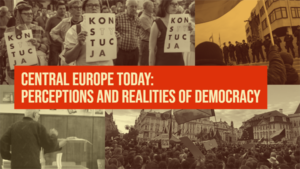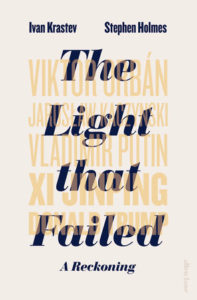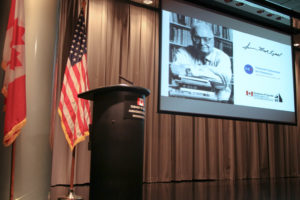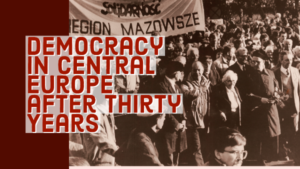 There’s has been extensive and ongoing debate about “what went wrong in Central and Eastern Europe” and what explains its various forms of illiberalism and democratic decline. A variety of, sometimes overlapping, explanations have been advanced, argues Seán Hanley, Associate Professor in Comparative Central and East European Politics at University College London’s School of Slavonic and East European Studies:
There’s has been extensive and ongoing debate about “what went wrong in Central and Eastern Europe” and what explains its various forms of illiberalism and democratic decline. A variety of, sometimes overlapping, explanations have been advanced, argues Seán Hanley, Associate Professor in Comparative Central and East European Politics at University College London’s School of Slavonic and East European Studies:
- Some say that the waning of EU leverage after enlargement in 2004-7 gave free rein to voters and politicians with sometimes weak democratic commitments; others that under the tutelage of EU, the region had too much top-down liberalism – especially too much economic liberalism – and not enough scope to find its own way;
 Ivan Krastev and Steven Holmes write eloquently about the cultural and socio-psychological strains of a “politics of imitation” and of the fading attractiveness of West European models after the 2008-9 recession, the Eurozone crisis and European Refugee crisis;
Ivan Krastev and Steven Holmes write eloquently about the cultural and socio-psychological strains of a “politics of imitation” and of the fading attractiveness of West European models after the 2008-9 recession, the Eurozone crisis and European Refugee crisis;- Jan Kubik speaks of a “delayed transition fatigue” in which the cultural and psychological trauma of the initial post-communist reform has finally made itself felt;
- Still others highlight the insufficiency of economic growth and the engrained value divide between Western and Eastern Europe, the lack of sizeable or wealthy enough middle class, and the exit of youngest and best educated citizens for opportunities abroad.
In the Power 3.0 Podcast episode “Contextualizing China’s Corrosive Capital,” from the National Endowment for Democracy’s International Forum, Martin Hala discusses the impact of China’s economic and political investments in the Czech Republic and elsewhere in Central and Eastern Europe, revealing these investments’ surprising ability to influence and impact governance institutions in the region and beyond.
 Rather than pathologizing the current Hungarian regime as a result of a unique master plan designed by a cynical political entrepreneur, the authors of a new book show the transnational dynamic of backsliding – a warning for other countries that suffer from comparable deadlocks of liberal democracy. Miklos Haraszti examines ‘Viktor Orbán’s Propaganda State’ in Brave New Hungary — Mapping the ‘System of National Cooperation’, edited by János Mátyás Kovács and Balázs Trencsényi.
Rather than pathologizing the current Hungarian regime as a result of a unique master plan designed by a cynical political entrepreneur, the authors of a new book show the transnational dynamic of backsliding – a warning for other countries that suffer from comparable deadlocks of liberal democracy. Miklos Haraszti examines ‘Viktor Orbán’s Propaganda State’ in Brave New Hungary — Mapping the ‘System of National Cooperation’, edited by János Mátyás Kovács and Balázs Trencsényi.
In other ways, however, the “what went wrong debate” is mis-framed. Outcomes in Central and Eastern Europe have certainly turned out differently from what was expected. But this tells us that intellectuals and social scientists have yet again gone wrong in their expectations, more than that the region has sharply changed course, Hanley suggests.
As Seymour Martin Lipset (below) suggested, we need to study democratization and its alternatives in Eastern Europe with a resolute ‘pessoptimism’. A scepticism about historical change cutting strongly in any particular direction, that does not rule it. A sense that positive and negative change may sometimes be intimately intertwined, he adds. This perhaps means recalibrating our thinking in four overlapping ways:
 First, we would do better to think in terms of open-ended trajectories and directions, rather celebrating or commiserating consolidation or de-consolidation of any one regime with too much certainty. Countries can move erratically in different directions. Poland, for example, was at the centre of attention in mid-2000s when democratic backsliding in CEE initially became a concern as the ‘capital of Central European illiberalism’, but after the short-lived 2005-7 coalition of populists and conservatives, it appeared instead a case of non-backsliding, before re-emerging as a prime backslider with the election in 2015 – and controversial judicial and institutional reforms – of the majority conservative-nationalist government of the Law and Justice Party.
First, we would do better to think in terms of open-ended trajectories and directions, rather celebrating or commiserating consolidation or de-consolidation of any one regime with too much certainty. Countries can move erratically in different directions. Poland, for example, was at the centre of attention in mid-2000s when democratic backsliding in CEE initially became a concern as the ‘capital of Central European illiberalism’, but after the short-lived 2005-7 coalition of populists and conservatives, it appeared instead a case of non-backsliding, before re-emerging as a prime backslider with the election in 2015 – and controversial judicial and institutional reforms – of the majority conservative-nationalist government of the Law and Justice Party.- Second, this reminds us political scientists that when we do think about political regimes, to think more in the longer term. Although it is possible that economic and political liberalism in Eastern Europe might prove an interlude, the evidence suggest that its short-term (and even medium term) reversals may be seen as Charles Tilly does terms as part of the ebb and flow of long-term democratisation – some of the episodes of backsliding which so preoccupy us today may prove short-term and reversible, better seen as illiberal ‘swerves’ or ‘near misses’ on a dangerous and winding road.
 Tilly sees democratisation as a complex, long-term contest between rapacious elites and social groups (and not always very liberal social groups) over state power and state resources. It is a perspective well-attuned to studying politics in the post-communist world. And it reminds that even – or perhaps especially – in the most open, decentralised and liberal political systems, democracy is about exercising and balancing power. So, third, we need a robust and unromantic view of what Philippe Schmitter termed “really existing” democracy, West and East, recognising the trade-offs and tensions, and the need to adapt and accommodate to some the illiberal realities, which we may not like but can learn to live with (social conservatism, populism, oligarchical parties).
Tilly sees democratisation as a complex, long-term contest between rapacious elites and social groups (and not always very liberal social groups) over state power and state resources. It is a perspective well-attuned to studying politics in the post-communist world. And it reminds that even – or perhaps especially – in the most open, decentralised and liberal political systems, democracy is about exercising and balancing power. So, third, we need a robust and unromantic view of what Philippe Schmitter termed “really existing” democracy, West and East, recognising the trade-offs and tensions, and the need to adapt and accommodate to some the illiberal realities, which we may not like but can learn to live with (social conservatism, populism, oligarchical parties).- In truth, despite the progress of the last thirty years, the social and economic gaps – and perhaps socio-cultural gaps – between Western and Eastern Europe stubbornly refuse to close with any speed or finality. Notions of catch-up, convergence or and gradual Europeanisation – while no useful for framing policy instrument – look dated, now look as political projects. This, finally, leaves the difficult task of making a Eastern Europe better, freer and more self-confident periphery. Conservative nationalist and lliberal populists in the region have understood and embraced the search for alternatives with alacrity.
This is an edited version of a presentation given at the “1989 – Great Expectations 30 years later” conference organised by the European Dialogue Expert Group and the Gorbachev Foundation, Moscow, 9 December 2019. RTWT.







